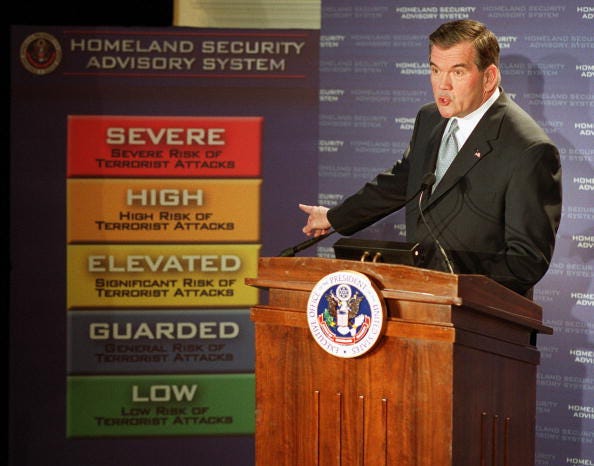Published with the generous permission of Ruth Ben-Ghiat. Read all of her outstanding writing in her Lucid newsletter.
By Ruth Ben-Ghiat
Where were you on 9/11, when two planes exploded into the World Trade Center and a third breached the Pentagon?
I was in New York City, heading downtown from the Upper West Side on the subway to teach. It was a perfect sunny fall morning. The mood in the subway car was chill. When we stopped suddenly, and the car went dark, it seemed like a routine event. Then someone across from me told us there had been an accident: a plane had hit a skyscraper.
The sirens and the smoke were overwhelming when we finally emerged onto Canal Street, less than two miles from the World Trade Center. Some shopkeepers had turned their televisions outward, or put them on the sidewalk. I crowded in to see the images, and learned that minutes later there had been a second attack.
I called my husband, who thankfully was way uptown, and tried to call my babysitter, who was in our apartment caring for our 3-month-old daughter, but cell service had been cut off. "I've got to get home to my baby," was my mantra as I walked the six miles back through a city of dazed and terrified souls.
I will never forget the stillness of the Upper West Side as I approached my apartment building that morning. It was as though nothing had happened. It was impossible to reconcile the calm with the chaos downtown. I ran in to hug my baby, and my frantic babysitter ran out to pick up her own child.
Later, survivors of the attack arrived uptown, their clothes and hair covered in ashes, their eyes deadened. Later, first responders came home to their families, their bodies having absorbed the toxins that would eventually kill many of them.
Later, we heard the stories of people who jumped from the World Trade Center towers, people who refused to leave until colleagues had been rescued, and people whose lives were saved because they stopped for coffee.
We heard far less about the attack on the Pentagon, one of the world's largest office buildings. The secretary of defense and the chairman of the Joint Chiefs of Staff had their offices there, along with 23,000 other service members and civilians. National security considerations accounted for some of the silence. The direct hit on the nerve center of the world's most powerful military was almost too threatening to be fully acknowledged - other than by a war of retribution.
9/11 was a classic "shock event," or a grave incident that prompts a state of emergency. Authoritarian leaders know how to manipulate national calamities to consolidate their power, as Adolf Hitler did after the Reichstag fire and Turkey's Recep Tayyip Erdogan did after the 2016 coup attempt.
9/11 showed the world that even in a democracy, government officials can use a crisis to do what they've longed to do anyway -- in this case, expand the military-industrial complex, create a security state, and boost energy resources by capturing Iraqi oil.
The Muslim faith of the terrorists spawned a wave of Islamophobia in America. A surge in hate crimes (from 28 to 481 incidents that year) made many Muslims afraid to leave their homes. Any Muslim could be a terrorist, the government seemed to say as it detained hundreds, often for immigration law violations. Some people were held for many months, locked down 23 hours a day.
The post-9/11 "war on terror" deployed strategies of repression and subversion that the U.S. used during the Cold War to prop up authoritarian states that persecuted leftists. Now Muslims were on the receiving end. The Guantánamo Bay prison camp, a "space of exception" --a place outside the jurisdiction of international and U.S. laws, where torture could be freely practiced -- was an example.
Traveling as a Muslim, or as someone with a Middle Eastern name, became a challenge. The creation of the Department of Homeland Security in 2002 consolidated border and transportation security agencies. New protocols kept people vigilant against the enemy. A DHS color-coded "threat advisory system," updated daily for release by the media, maintained the necessary state of anxiety among the public to justify state actions.








